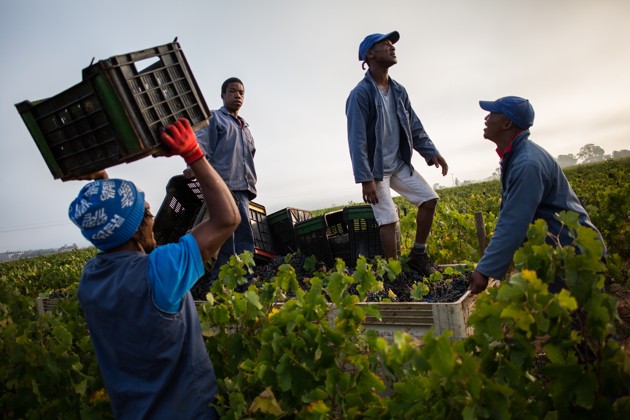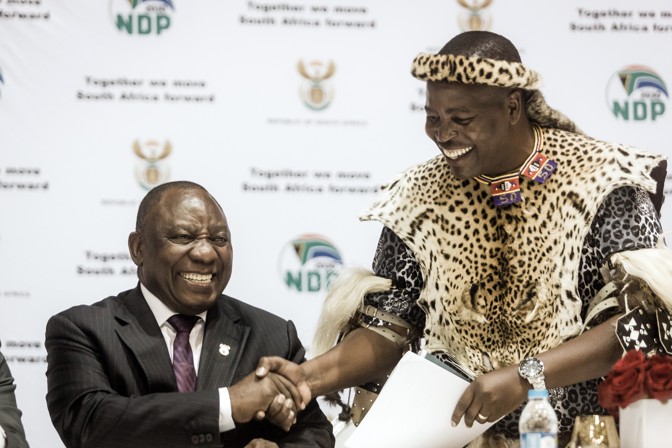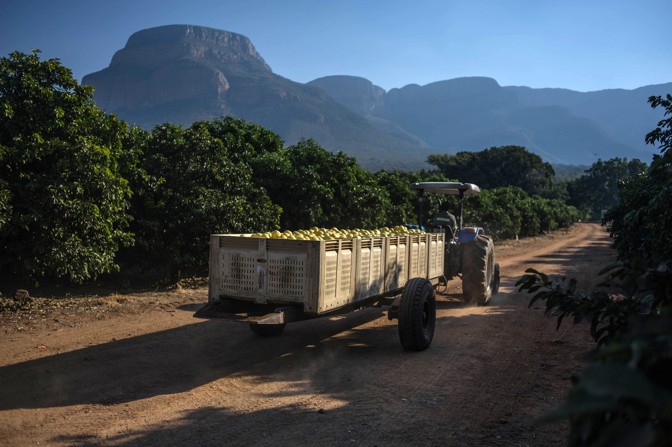ZOLANI, South Africa—On the outskirts of this overcrowded township in South Africa’s Cape Winelands, Phumlani Zota, a 32-year-old pig farmer, sifted through piles of waste in a refuse dump beneath the Langeberg mountains, filling a burlap sack with scraps of food for his livestock. “There is not enough land here,” he told me.
Yet on all sides, the impoverished settlement was hemmed in by great tracts of white-owned farmland, neat rows of fruit trees and grapevines punctuated by ornate Cape Dutch architecture.
The disjuncture is jarring, but mirrored all over South Africa. During apartheid, Zolani was designated a “blacks only” area by the Group Areas Act, one of about two dozen federal policies that dramatically restricted black South Africans’ access to land and opportunity. Today, the township stands as contemporary evidence of the wholesale land dispossessions carried out by successive colonial regimes, from the 17th century until as recently as the 1980s.
According to a 2017 land audit by the South African government, 72 percent of the country’s arable land remains in the hands of whites, who account for fewer than 10 percent of the total population. Since the ruling African National Congress came to power in 1994, under the stewardship of Nelson Mandela, one of its central undertakings has been to relieve this disparity. But to date, the spotty efficacy of the ANC’s land-restitution efforts has seen barely a quarter of such land restored to black farmers, according to the farmers’ organization AgriSA.
Now, with general elections slated for May, the renewed promise of meaningful and long-overdue land reform is once again a key feature of the ANC’s political campaign. The country’s lack of progress on resolving the issue speaks not just to the varied issues facing South Africa—from poor economic growth to spiraling unemployment—but also to the broader difficulty of finding practical solutions to redress historical injustice. It is a challenge informed not only by domestic politics, but also by years of chaos in neighboring Zimbabwe, which has seen ill-fated attempts at land redistribution of its own.

The issue of land reform—and more specifically, of taking land from white farmers—has become a cause célèbre in the United States, Canada, and Britain, largely among white right-wingers, and even reached the Oval Office last year, when Donald Trump tweeted about it. Here in South Africa, the issue of land redistribution is complex, and has a long history characterized by a series of ineffectual and ill-defined government programs and a lack of political will that spans successive cabinets.
[Peter Beinart: Trump’s peculiar sympathy for white South Africans]
In the debate’s most recent incarnation, South African President Cyril Ramaphosa proposed a constitutional amendment last year that would allow the government to seize “unused” private land without compensation, a process known as expropriation, and redistribute it to disadvantaged black farmers. The ANC has made repeated, albeit vague, promises that this change would have far-reaching economic benefits. In December, after months of emotive public hearings that showed strong support for the amendment, the National Assembly, the elected house of Parliament, voted overwhelmingly to draft it, and an ad hoc committee has been established to oversee that process. Ramaphosa also created an advisory panel on land reform, which is due to submit a final report of recommendations before elections.
Yet it’s unclear how the ANC ’s proposed policies would be implemented, with critics voicing concern around potentially slow, cumbersome, and costly legal processes and a lack of cohesion between national and local government structures. Draft legislation also gives no guidance for dealing with customary and communal forms of land ownership, such as where traditional authorities administer land on behalf of rural people.

The system in place now has its own pitfalls. It relies on the so-called willing-buyer, willing-seller approach, which effectively calls for volunteers, allowing white landowners to refuse to sell or to demand exorbitant fees. Deficient regulation has also resulted in nonarable land often being sold first.
The failure to fix the system has been compounded by rampant corruption, which has decimated provincial land-reform budgets and prioritized spurious land claims. Combined with a protracted drought and persistent concerns about state maladministration, the corruption and uncertainty are harming South Africa’s agricultural sector, driving investor confidence lower.
Even for those black South Africans who have managed to buy farmland, government assistance is minimal. Many of the farms that have been transferred to black farmers, including former farm laborers, through past ANC-supported restitution programs now lie fallow. New farmers installed on expropriated land have received scant financial, operational, or infrastructural support, despite promises from the state. Others are never installed: Because of woefully slow processing, as many as 4,000 farms bought by the government have yet to be distributed to new owners.
[Read: How apartheid haunts a new generation of South Africans]
In the verdant northern province of Limpopo, Thato Moagi—a 28-year-old commercial farmer and a member of Ramaphosa’s advisory panel on land reform—is among the minority of black farmers who have attained the means to secure their own success. Her father, who was directly affected by forced removals in the 1960s, repeatedly applied for agricultural funding. But, in 2013, after more than a decade of appeals, he and his wife used their life savings to buy the Limpopo farm that Moagi, who graduated from the University of South Africa with a degree in agricultural science, now runs.
Despite the success of the farm, which has livestock, food crops, and an apiary, Moagi still believes that she could do much more with government investment. “The government is not addressing the issues that young or emerging or first-generation farmers are experiencing,” she told me, adding that access to start-up capital is often foremost among these issues.
Moagi is heading up a new social-development project in the Cape Winelands, working with a luxury residential estate and a golf course to establish a commercial farm that will also serve as an incubation platform for young prospective farmers. “Generations of people have been affected by past laws and actions, and we need to start addressing that with the next generation,” she told me.

For white farmers, however, the government’s moves have sparked trepidation. “Today I’ve got an asset. Tomorrow, maybe I’ve got no asset, no means of making any living as we know it,” Denys Hobson, a former national-team cricket player who owns a 500-hectare goat farm near the village of Greyton, told me.
Those I interviewed not only worry about their land, and thus their livelihood, being taken, but also noted that expropriation without compensation could have devastating economic implications for their predominantly black workforce. Jacques Beukes, a 37-year-old fourth-generation grape farmer whose family owns 100 hectares of land in the fertile Hex River Valley, about an hour’s drive from Zolani, also told me many farmers feared a repeat of the violent state-sanctioned land grabs that left the Zimbabwean economy in tatters in the early 2000s.
That fear of violence was a persistent topic brought up in conversations with white farmers. Research from AgriSA shows that farmland murders are at a 20-year low, accounting for just 47 of the more than 20,000 murders recorded in South Africa from April 2017 to March 2018. However, many I spoke with suggested a correlation between populist land-reform rhetoric adopted by the ANC and by the Economic Freedom Fighters, a far-left opposition party, and what the white farmers said was an upsurge in racially motivated farmland murders.
One advocate for white farmers—Ernst Roets, the deputy CEO of AfriForum, a right-wing Afrikaner-rights organization—told me that, should Ramaphosa’s constitutional amendment pass, there could be violence from the farm owners as well. But Beukes believes that such claims are unhelpful, and said there were “definitely scenarios where government and commercial farmers could work together.”
For some, the preelection political rhetoric has been too narrowly focused on the proposed constitutional amendment. Politicians within Ramaphosa’s own party, as well as prominent political opponents including the centrist Democratic Alliance, have said that the constitution is being scapegoated for the state’s failure to restore land.
[Read: How to save the African National Congress]
“This does not help us resolve the really big debates about who should be getting land, where do we need to focus this program, and what do people want land for,” Ruth Hall, a land-reform expert at the University of the Western Cape, told me. But she expressed hope that the emergence of land reform as a key election issue had “not only focused attention on questions of historical redress, but also on making land available to meet people’s needs now.”
With around 14 percent of black South Africans living in squalid and ever-expanding informal settlements on the periphery of major cities, fast-tracking well-located urban land for housing is foremost among those needs. In his State of the Nation address in February, Ramaphosa said that his cabinet had identified state-owned land in urban areas for imminent redistribution. This land could also make a considerable contribution to addressing rural land reform. More than 11 percent of South Africa’s total land falls under public ownership.
Back in Zolani, Phumlani Zota, whose forebears labored on largely unproductive farmland in the former black homelands of the Eastern Cape during apartheid, said that he didn’t trust the ANC to deliver on its renewed promises.
On a scruffy patch of communal land at the edge of the settlement, he leaned his short, sinewy frame on the makeshift fence that wrapped around his small plot, as his 30 pigs noisily devoured the scraps that he’d lugged down the hill from the refuse dump. About a hundred meters away, a rusty barbed-wire fence marked the perimeter of an expansive white-owned farm. “Maybe things will change for the next generation,” he said.

No comments:
Post a Comment